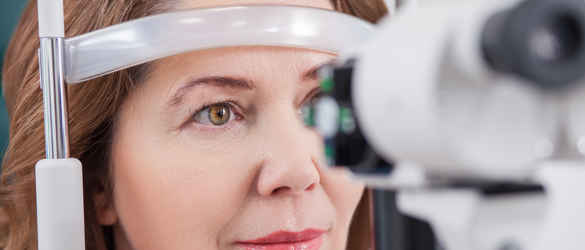
Protecting your eyes
Bright light may be uncomfortable for many people with macular conditions. It is important to protect your eyes from glare and ultraviolet light.
Glare
Glare is the visual discomfort caused by too much light. Some macular conditions can make glare more of a problem and some people become very sensitive to light. Other reasons include cataracts, which scatter light as it enters the eye.
Tips to reduce glare:
- Wear a hat or cap with a wide brim or peak.
- Choose a close-fitting style of sunglasses or wrap-around frames.
- Try anti-glare filters in the form of 'fit-overs' which have built-in side and brow shields. These are worn on top of ordinary glasses.
- If white paper causes glare when you read, try using a transparent plastic 'overlay' sheet or wearing yellow anti-glare glasses. If you are writing, try yellow paper as it is less likely to reflect.
- If you find the computer screen uncomfortable, reduce the brightness or change the 'view settings' on a website home page. There are plenty of useful tips online on how best to use technology. Yellow anti-glare spectacles can also help.
- Make sure the lighting at home is bright and even. Lamp bulbs should be covered by shades and positioned so light doesn't shine directly into your eyes. For more information please see our Lighting webpage.
Ultraviolet light
Ultraviolet light (UV) comes from the sun and is invisible to the human eye. UV light can cause sunburn and eye damage.
Studies suggest that some people could be at a higher risk of developing macular disease because they have low macular pigment, which protects against UV light. Macular pigment is made up of antioxidants such as lutein, which is thought to act as a natural sunscreen for the macula. Lutein is found in a lot of leafy, green vegetables. You can read more about eating for your eyes by visiting our Nutrition webpage.
It is important to protect your eyes from UV light to prevent further damage but unfortunately you cannot reverse any damage that has already been done. Encourage everyone you know to have regular eye tests and wear hats and sunglasses. Reflections from sand, snow and water increase the effects of UV light.
Video: Essential tips for protecting your eyes
The video below provides essential tips for protecting your eyes from glare and ultraviolet light.
Sunglasses and UV filters
- Make sure sunglasses have a UV filter, and the lenses are good quality by choosing glasses with a European CE mark or British Standard BS EN ISO 12312-1:2013.
- Sunglasses marked UV 400 should block 100% of UV.
- UV filters can be clear. They can be used in ordinary prescription glasses, sunglasses and contact lenses. Top tip - Never use a tinted lens for driving at night. You can reduce glare from headlights by keeping your windscreen clean inside and out, and getting anti-reflection coated lenses for your driving spectacles.
Blue blocking lenses
Blue blocking lenses are filters that protect your eyes from both UV and blue light that causes glare. Traditional sunglasses make things look darker. Many people with macular disease find this reduces their level of vision, making it harder to see steps or other hazards.
Sunglasses generally do not protect the eyes against the sun's blue light, which can also damage the eyes.
Blue blocking lenses protect your eyes from blue light. They also reduce glare without making everything darker. Blue light tends to make things hazy, so blue blocking lenses can sharpen images. These lenses are usually yellow or orange, although other tints can be added to improve their appearance.
Paler yellow lenses are good for indoor use because they work well in artificial light, while a range of shades can be suitable for outdoor use depending on the lighting conditions.
Blue blocking lenses can be ordered from low vision services, sensory impairment teams and resource centres for the visually impaired. Ordinary prescription glasses can also be made with blue blocking filters.
There are no British or European standards for blue blocking lenses, so buy from a reputable company, or ask your optometrist or optician for advice.
Eye tests
Regular eye tests are an important health check for everyone. They can often detect the early signs of many eye and general health conditions before you become aware of any symptoms. You should have an eye test every two years or as often as recommended by your optician, even if you don’t have any problems with your sight.
Healthy living
Making small changes to your everyday life could help you to feel happier and healthier. Discover nutrition, eye health and mental health advice from our experts.
Get the latest news and advice from the Macular Society
To hear about life-changing research, treatments and tips for living with sight loss, subscribe to our monthly enewsletter today. Together we can Beat Macular Disease.
Sign up to our free email newsletter



